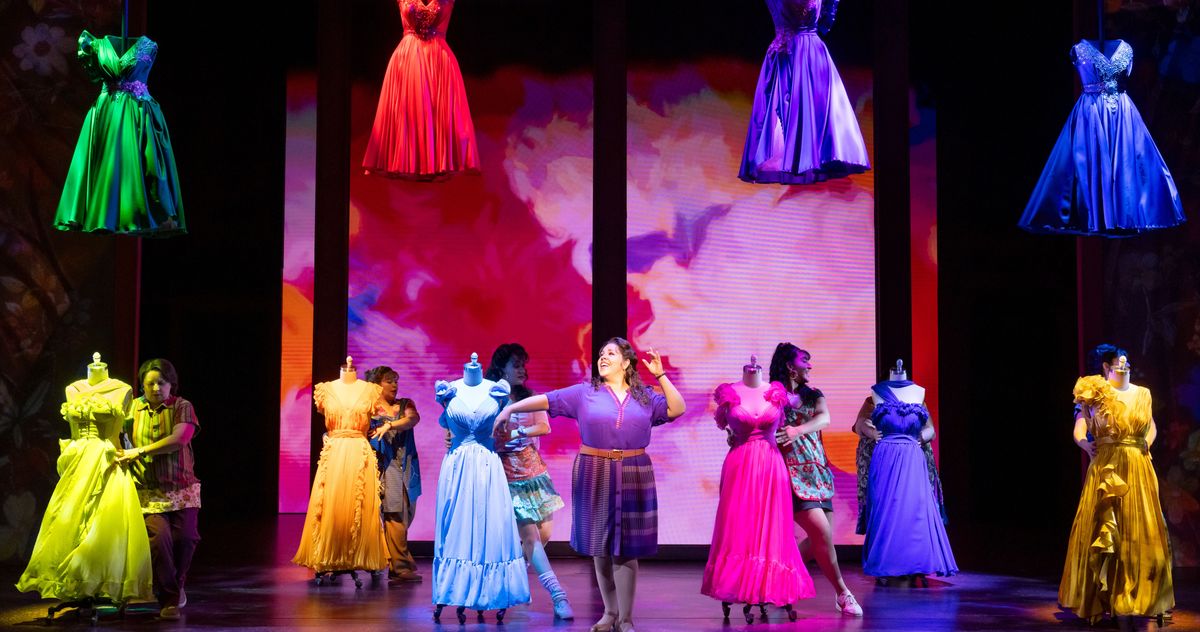The new musical Real Women Have Curves is, on the whole, a vibrant, exuberant affair, soaked in the pink and gold of L.A. sunsets, with painterly projections of tropical blossoms regularly unfurling across its proscenium in such verdant profusion you can practically smell their perfume. Yet surrounded by all this lushness, the show’s darkest, grayest moments are some of its most striking. In an INS detention center outside Los Angeles, a young woman named Ana (Tatianna Córdoba) gets ten minutes with her friend Itzel (Aline Mayagoitia), a refugee from Guatemala who’s been seized by the federal forces Ana’s community refers to with shudders as La Migra. Ana is 18, the only U.S. citizen in her family, and an aspiring writer who dreams of going to Columbia University. Now, if she wants to save her friend from immediate deportation, she has to fill out a form agreeing to “sponsor an alien” — a form that demands addresses, where she works and where she lives. She works at her sister’s garment business, where almost all the women are undocumented. She lives with her parents, immigrants from Mexico who’ve built a life in L.A. despite the fact that, before she was born, her father “was thrown back four times.” “How could I give them our address?” she sings, struck by panic and guilt, suddenly ashamed of her own naïveté in the face of a system long honed for maximum heartlessness.
Ana’s story takes place in 1987, and the play and subsequent movie it was based on premiered in 1990 and 2002 respectively (the latter was America Ferrera’s big break). In its new stage form—with a book by Lisa Loomer and Nell Benjamin and music and lyrics by Joy Huerta and Benjamin Velez—those gaps of time make no difference to the force with which the looming presence of ICE in the life of its characters lands with a cruel thud in the chest. If anything, that distance only compounds the devastation: Here we are, more than two decades on, under a president and cabinet gleefully deploying immigration police like their own personal Gestapo, madly cancelling visas, arresting judges, and snatching people out of their dorms, out of their citizenship interviews, and off the streets. The school Ana longs to attend has disgraced itself. The dark has gotten exponentially darker.
Amidst such a torrent of fascist chaos, the brightness and backbone of Real Women Have Curves feel bracing. Directed and choreographed with plenty of energy by Sergio Trujillo, this is a musical that does what it sets out to do and, by weight of circumstance, then some. It’s got plenty of bubbly, cheeky joy and big-dreaming sincerity, but it pulls back before crossing the line into either treacle or fluff. Its politics, while robust, are inherent — they resonate because we witness them playing out with terrible urgency in the lives of its characters and in the world around us, not because they’re a flag being awkwardly fluttered by the creators for the sake of their own egos. There’s also an emotional maturity to the arc of Loomer and Benjamin’s book (Josefina López wrote the original play): Shock and revelation are less drivers of its plot than daily work — both the kind that’s done to pay the rent and the effort it takes, through deep frustration and the crossed wires of generations and cultures, to stay caring, keep listening, and to remain bravely open to change.
Another show might have had Ana hide the fact that she’s gotten into Columbia on a full scholarship, ratcheting up the tension until a climactic blow-up with her family. Real Women takes a more tender, less histrionic approach. Ana’s sister Estela (Florencia Cuenca) and her mother Carmen (Justina Machado) know from early on about the college acceptance letter, and the not-to-be-crossed Carmen—who believes Ana’s place is at home helping to support her family—makes her feelings abundantly clear. The play’s emotional arc hangs on the gradual development of daughter and mother’s relationship — their struggle with each other, their own inner lives, and the ways in which both women love fiercely without always necessarily being able to see clearly. Machado is excellent as the sharp-tongued matriarch who has, in certain ways, cultivated an outsized personality specifically in order to mask the fears and hardships she’s managed all her life. When Ana returns to her sister’s garment factory crushed by her failure to save Itzel, the women there all greet her with a certain amount of hard-bitten knowing, and none more so than Carmen. “You deal with it,” she tells her daughter. “And you learn to pack fast.” Earlier, in a less somber vein, Machado made delightful work out of “De Nada,” a song in which Ana’s parents (her father, Raúl, is played with lovely understatement by Mauricio Mendoza) remind her of her filial responsibilities. “I carried you nine months inside my belly,” sings Carmen, as Raúl and Estela chime in with the song’s eponymous refrain. It’s a sly little cultural lesson in both love and passive aggression: It’s nothing, in this context, means Oh, it’s a very big something and you’d best not forget it.
A big part of Real Women’s appeal, though, has to do with the way the story, along with its design, expands beyond the container of a family drama. Hana S. Kim’s video has a sweeping, refreshingly handcrafted feeling, saturating Arnulfo Maldonado’s malleable set with watercolor cityscapes and adorning it with illustrations reminiscent of Latiné street art — or, in the case of Estela’s song “Daydream,” bringing back that rainforest of flowers as the character imagines embracing her artistry and starting her own fashion label. While Ana dreams of New York and balances a sweaty summer helping at her sister’s business with an internship at the local paper (and, eventually, a budding romance with fellow intern Henry, played with sweet nerdiness by Mason Reeves), Estela has her own mountain to climb. She and her team take on an “impossible order”—two hundred dresses in three weeks—from a highbrow client who’s likely to try to snake her way out of paying. And always, the threat of La Migra hovers. Loomer and Benjamin effectively braid these threads into a portrait as much of place and community as of a single young woman’s aspirations. At the same time, Huerta and Velez’s songs—filled with strains of salsa and mariachi and featuring some virtuosic guitar work—are buoyant and engaging. Even the more sentimental numbers, like Itzel’s “If I Were a Bird” (sung beautifully by Mayagoitia), have their mischief: “So far beyond and gracefully out of reach,” she sings, “From La Migra, politicians, and boys / Who just wanna… You know. / If I were a bird, I’d chit on that.”
Meanwhile, the musical’s ensemble—who have the glow of being involved in a project they genuinely want to show up for—approach its more broadly comic moments with a gusto that stays dry enough to avoid schlock. In “Adios Andrés,” the women at Estela’s factory have to break it to 52-year-old Carmen that no, she’s not pregnant again. She’s reached menopause, and it’s time to say farewell to “Andrés who comes every month.” It’s a genuinely funny song, and it’s also frankly a treat to hear a group of women—many of them bigger-bodied, many of them middle-aged, all of them crack performers—sing enthusiastically about their periods. Unsurprisingly given the title, that element of body positivity (though no one would have called it that in 1987), also forms a strong current in the show. As an aspect of Ana’s coming of age and of the increasing confidence and intimacy amidst all the story’s women, it’s handled with humor and grace.
Funnily enough, the most awkward thing about it, and about the musical as a whole, sits at the top of the marquee. I suppose it would have been an impossible sell to change the title (and consequently the title song, belted by Ana as all the women revel together in their underwear) of a well-known and successful property. Nevertheless, the musical’s name feels like the only truly dated ingredient in an otherwise appealing recipe. Any claim that starts with the words “real women” these days can’t help conjuring strains of TERF-iness, but even in its own context, why insist that women need any particular kind of body? Does liberation always have to come in pendulum swings, rather than as a less reactive, more thoughtful widening of one’s embrace? At least the show itself opens its arms fully, and delivers a warm, sturdy squeeze of a hug.
Real Women Have Curves is at the James Earl Jones Theatre.












